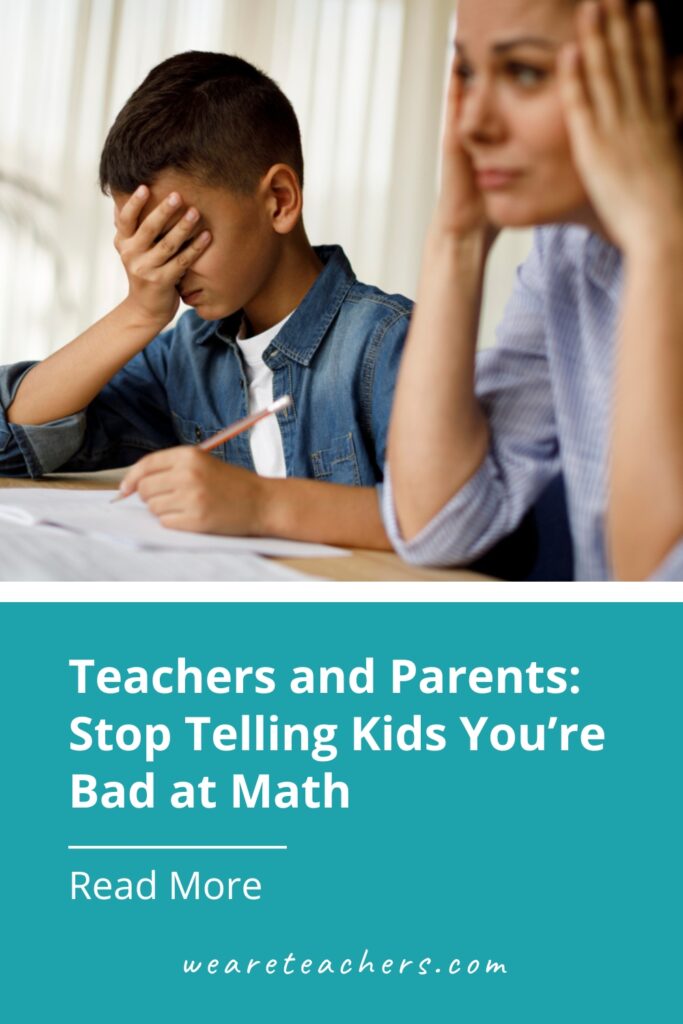In fourth grade, I struggled with subtraction. But instead of branding me as “bad at math” or saying, “You must have more of a language arts brain,” my teacher’s patience and belief in me changed everything.
By fifth grade, thanks to dedicated teachers, I was acing every math assignment. I would later major in mathematics and teach eighth grade math, and I now use econometrics in research. My journey was shaped by mentors who believed in me and were careful in the way they spoke about my abilities.
But is everyone this lucky? Not by a long shot.
What it sounds like
Part of why this situation is so tricky is because adults make comments about how hard math is with good intentions. They don’t sound mean. Sometimes they’re delivered with a humorous, self-deprecating tone. Other times it’s an effort to make a child feel better or validate their feelings. And sometimes, they might not even be talking to kids—just making a comment within earshot to another adult.
Here are some examples.
- “Oh, I only gave you a 20? Sorry! I’m so bad at math.”
- “I’m just not a math person.”
- “Sorry, kids—looks like I numbered your tests wrong. Just another reason why I’m not a math teacher!”
- “[Child] has so many gifts. Math just isn’t one of them.”
- “I stopped being able to help her with her math homework in, like, second grade.”
- “The left brain is more logic while right brain is more creativity. You’re more right-brained, which is why math is harder for you.” (Not true, by the way.)
- “My husband is great at math, and I’m not. [Child] must take after me.”
When we say we’re bad at math, it might feel true—like we’re simply acknowledging the reality that we can’t be equally skilled at everything. But there’s a difference between saying, “We all find certain skills easier to learn than others,” and “I am inherently lacking skills related to an entire field of study.”
Interestingly, when I ask adults who say they’re bad at math if they’ve always felt this way, the answer is almost always no. They felt capable in math until it got harder in junior high and they were too embarrassed to ask for help. Or they liked math until a teacher or parent made them feel like it wasn’t their “thing.” Yikes!
Why this hurts
All humans have beliefs about themselves that can change the way we handle difficult tasks, and psychologists refer to these as “entity theories.” This study in particular had girls and boys playing a matching game. After an initial round, some children were told that the other gender was really good at that game (so girls heard that boys were more competent, and boys heard that girls were more competent). Then, each child went on to play another, more difficult round.
Here’s the thing. The kids who were told that the other gender was better? Their scores dropped by an average of 12.8%. The scores of the kids who weren’t told anything dropped by only 2.8%.
Another study finds evidence of this impact on students, too; here is another study that finds adult statements impact student performance, and another study with similar findings.
These findings go beyond relationships or correlations—these findings are causal. In other words, these experiments are set up to point directly back to the effect of adults’ words on children. Even if the adults making the statements had good intentions, those good intentions don’t matter when the impact is negative.
Who this hurts
From the study above, we know that entity theories aren’t good for kids. But when it comes to math in particular, negative comments hurt girls more than boys.
Educators and parents have to be careful with what they say about math in front of girls. In the studies cited above, the effects were exacerbated more for females compared to males. Girls tend to have lower self-beliefs about their mathematics abilities compared to boys. A girl who hears women mindlessly touting they are bad at math—no matter how casually or jokingly—could internalize the message as, “Wow, the women I look up to keep saying they are bad at math. This must be true for me, too.”
What to say instead
So maybe you’ve read this and you thought, “Rats, I’ve said that before, but I didn’t mean it to be so detrimental. What can I do now?”
When a student is struggling with math, here are some ways to respond:
- Validate their feelings (without creating an entity theory). “I hear you. Learning any new skill can feel hard at first. But that’s not a permanent feeling.”
- Teach students about growth mindset. “None of our abilities are set in stone. When we lean in to struggle, we’re expanding those skills.”
- Normalize failure. “We have to mess up in order to learn. The biggest minds in math—or any field—had to get very comfortable with getting the answers wrong first.”
- Encourage perseverance. “I know you can do this. And I’m here to help every step of the way.”
- Offer perspective and connection. “Math is about numbers—but it’s also about pushing through discomfort until you figure something out. What other skills are like that?”
- Demystify “hard.” “I believe you that solving systems of equations feels hard right now. You know what feels super challenging to me? [Insert relevant skill you know they excel at]. What advice would you give me?”
- Emphasize hard work and learning over performance. “Grades and test scores are just one measurement for learning. Let’s talk about some of the other ways I measure success.”
Our beliefs about ourselves are shaped by the voices we hear, especially during our formative years. As educators, parents, and role models, we hold a responsibility in modeling these beliefs. Let’s champion a narrative where challenges are embraced as opportunities for growth, where the process of learning is celebrated more than the outcome, and where every child believes in their math potential. As I would tell my students: Learning math is not just about numbers but the stories we tell ourselves about our capabilities, perseverance, and power to overcome.
Looking for more articles like this? Be sure to subscribe to our newsletters!


